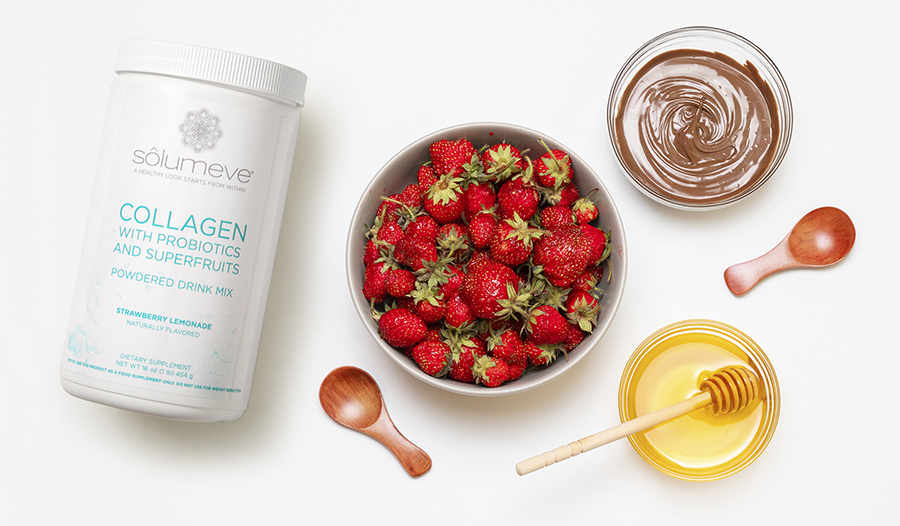Top 3 Popular Collagen Flavors: Strawberry, Chocolate, and Vanilla

Gone are the days of bland unflavored collagen being the only choice for those who wish to supplement with this amazing protein. With the rise of tasty collagen flavors like chocolate, vanilla, and strawberry, there's a delicious collagen option for even the most meticulous collagen connoisseur. Learn why collagen is such an essential protein for the body and why flavored collagens are now all the rage.
What Is Collagen?
Collagen is one of the most abundant proteins in the body, making up approximately 30% of the proteins in the body. The name collagen originated in the 19th century from the Greek words "glue" and "to produce." People noticed that gelatin, or glue, was produced upon boiling connective tissue like tendons and ligaments.
Collagen helps to support cell structure and tissue shape and contributes to tissue organization and mechanical integrity. It is the main component in structures such as tendons, ligaments, skin, and cartilage.
There are 28 different types of collagen, with each type playing a specific role in the body's functions.
For example, Type I collagen makes up about 90% of organic (carbon-based) bone mass and is the main component in tendons, ligaments, skin, and even the cornea of the eye. Type II collagen is the main component of hyaline cartilage, which lines synovial joints (joints lined with a thin layer of synovial fluid) and helps with producing movement such as bending your knee or curling your fingers.
On the other hand, Type III collagen plays a crucial role in the structural integrity of the hollow organs, such as the uterus, bowels, and blood vessels (arteries, veins, etc.). It is easy to see how collagen is such a vital protein in daily bodily functions.
Health Benefits of Collagen
Skin
In addition to all this, collagen has other important health benefits. When many people think of collagen, they automatically think of smooth, wrinkle-free, youthful skin, for example. However, this isn't the only benefit that is often associated with collagen. Because collagen is an abundant protein with many different bodily functions, the benefits can be more than skin-deep.
Wound Healing
For one thing, collagen can help to promote proper wound healing. One study followed individuals being treated for wounds who had impaired wound repair. These individuals were given a special collagen-infused gauze to treat their wounds. The individuals who received the collagen-laced gauze experienced a faster wound-healing time than did individuals who did not receive the gauze.
Bone, Tendons, and Joints
Collagen may also help improve the symptoms of osteoarthritis and osteopenia (a weakening of the bones). Studies suggest that taking collagen orally daily can help improve pain associated with osteoarthritis and even increase bone metabolism, leading to a lower rate of bone mass loss and stronger bones overall. Evidence suggests that daily collagen intake may prevent bone mass loss from the vertebral (the bones that make up the spine).
Research also suggests that taking an oral collagen supplement can help improve Achilles tendinopathy. This painful condition involves degeneration of the Achilles tendon in the heel, leading to a loss of function. Studies showed that individuals taking an oral collagen supplement for three months had improved range of function and less pain in the Achilles tendon region. This improvement was better than individuals who had taken a placebo. Collagen is a necessary protein for a healthy body.
Anti-Aging
With all of the benefits collagen may provide, including longevity and anti-aging properties, it would be remiss not to mention the effects collagen has on the skin. Studies show that collagen can benefit overall skin health and appearance. For example, a meta-analysis of 1125 individuals found that supplementation with a hydrolyzed collagen supplement over 90 days led to improved skin hydration, increased skin elasticity, fewer wrinkles, and more youthful-looking skin.
Types of Collagen Supplements
Knowing that collagen is such an essential protein for the optimal function of so many different parts of the body, many people opt to add collagen into their supplement routine. This is because the Standard American Diet (SAD) usually doesn't provide enough collagen for overall health.
If you struggle to get enough collagen in your diet, here is some good news: many different types of collagen supplements can meet your needs. Collagen supplements can range from unflavored collagen capsules to delicious flavored collagen powders.
Unflavored collagen comes in powder or capsules and can be hydrolyzed or not. Hydrolyzed collagen has been broken down into smaller protein components called amino acids. This helps to make the collagen easier to absorb and digest.
Unflavored collagen can be added to your coffee or morning protein shake to increase your collagen intake, but what if you don't prefer unflavored collagen? What if you need an extra boost of flavor with your collagen?
This is where flavored collagen comes into play. The most popular flavors of collagen are chocolate, vanilla, and strawberry. Flavored collagen can help increase your collagen intake while enhancing your tastebuds, giving you a new way to enjoy your collagen.
For many, flavored collagen is more like a beneficial treat than a healthy snack. That's because flavored collagens, like chocolate, vanilla, and strawberry, can make a simple glass of water taste like a delicacy.
Flavored collagen may be best for you if you struggle with the bland, neutral taste of unflavored collagen, you forget to take your collagen regularly due to a lack of flavor, or you just want to add a boost of flavor to your collagen routine.
Flavored collagens, like chocolate and vanilla, have been gaining in popularity due to their taste and versatility. Strawberry collagen is now included in the hydrolyzed collagen craze, and for a good reason. Strawberry-flavored collagen is tasty and a healthy alternative to other fruity, sugar-filled treats like strawberry shortcake or strawberry ice cream. It also gives collagen consumers another choice in the ever-expanding favors of this crucial protein.
Takeaway
Using flavored collagen is just as easy as using unflavored collagen. Add your favorite collagen flavor—chocolate, vanilla, or strawberry—to water, coffee, or the liquid of your choosing, and enjoy. You can also add your flavored collagens to other foods, such as yogurt, smoothies, or even oatmeal, to add a vibrant boost of flavor.
If you don't like unflavored collagen because of its bland taste, you don't have to miss out on the fantastic benefits this essential protein may offer. Try giving chocolate, vanilla, and/or strawberry collagen flavors a try. You might find yourself a new tasty and healthy treat!
References:
- Armiento AR, Alini M, Stoddart MJ. Articular fibrocartilage - Why does hyaline cartilage fail to repair? Adv Drug Deliv Rev. 2019;146:289-305. doi:10.1016/j.addr.2018.12.015
- Daneault A, Prawitt J, Fabien Soulé V, Coxam V, Wittrant Y. Biological effect of hydrolyzed collagen on bone metabolism. Crit Rev Food Sci Nutr. 2017;57(9):1922-1937. doi:10.1080/10408398.2015.1038377
- de Miranda RB, Weimer P, Rossi RC. Effects of hydrolyzed collagen supplementation on skin aging: a systematic review and meta-analysis. Int J Dermatol. 2021;60(12):1449-1461. doi:10.1111/ijd.15518
- Gelse K, Pöschl E, Aigner T. Collagen—structure, function, and biosynthesis. Adv Drug Deliv Rev. 2003;55(12):1531-1546. doi:10.1016/j.addr.2003.08.002
- Paul C, Leser S, Oesser S. Significant amounts of functional collagen peptides can be incorporated in the diet while maintaining indispensable amino acid balance. Nutrients. 2019;11(5):1079. Published 2019 May 15. doi:10.3390/nu11051079
- Praet SFE, Purdam CR, Welvaert M, et al. Oral supplementation of specific collagen peptides combined with calf-strengthening exercises enhances function and reduces pain in Achilles tendinopathy patients. Nutrients. 2019;11(1):76. Published 2019 Jan 2. doi:10.3390/nu11010076
- Ricard-Blum S. The collagen family. Cold Spring Harb Perspect Biol. 2011;3(1):a004978. Published 2011 Jan 1. doi:10.1101/cshperspect.a004978
- Sorushanova A, Delgado LM, Wu Z, et al. The collagen suprafamily: from biosynthesis to advanced biomaterial development. Adv Mater. 2019;31(1):e1801651. doi:10.1002/adma.201801651
- Tripathi D, Rastogi K, Tyagi P, et al. Comparative analysis of collagen and chitosan-based dressing for haemostatic and wound healing application. AAPS PharmSciTech. 2021;22(3):76. Published 2021 Feb 16. doi:10.1208/s12249-021-01944-9
- Uivaniemi H, Tromp G. Type III collagen (COL3A1): Gene and protein structure, tissue distribution, and associated diseases. Gene. 2019;707:151-171. doi:10.1016/j.gene.2019.05.003
DISCLAIMER:This Wellness Hub does not intend to provide diagnosis...
















































































 Table of Contents
Table of Contents















